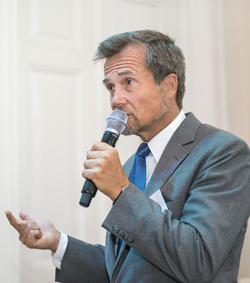A business relationship between the customer and the ecosystem
The market for home automation and consumer energy management never really took off, said Dr Dirk Schlesinger, global lead for manufacturing industries at Cisco Systems, which designs, manufactures, and sells networking equipment. But he believes we are now approaching a tipping point for a technology-aided reduction in domestic energy consumption, thanks to the widespread adoption of personal digital devices, such as smartphones and tablets – coupled with increased customer awareness.
 Open, multi-tenant, multi-service platforms enable ecosystems, spur service innovation and address the challenges of data-privacy and security at the same time, said Schlesinger. But how can such platforms be unified? According to Schlesinger, the answer is the new buzzword in the IT and telecoms industry; The Internet of Everything which has the potential to grow global corporate profits by 21 per cent by 2020.
Open, multi-tenant, multi-service platforms enable ecosystems, spur service innovation and address the challenges of data-privacy and security at the same time, said Schlesinger. But how can such platforms be unified? According to Schlesinger, the answer is the new buzzword in the IT and telecoms industry; The Internet of Everything which has the potential to grow global corporate profits by 21 per cent by 2020.
There’s an impressive push of products into the market, but a truly connected smart home doesn’t yet exist; attempts have addressed only selected functionalities and development costs have been prohibitive, he said.
Confused consumers
According to Schlesinger, there’s a lack of established standards and dominant platforms, which creates confusion among customers. Payback is doubtful and consumers aren’t sure which platform to follow.
“The technology is not the challenge. But how can you make it general purpose?” asked Schlesinger. He presented an example of a product already available in the USA, which supports a variety of sensors, key pads, and cameras. It has advanced power management to support 24-hour backup.
Schlesinger said what is needed is a technically open – but not open source – enabling platform to be launched globally in markets with a combination of high energy costs and home ownership. It should cover all home functionalities.
People and organisations must work together to make the smart home work, said Schlesinger, adding that customers should know their preferences when controlling their own world. They have already accepted IT as being part of daily life, and use smart gadgets to automate some tasks. “Something needs to come of it for the customer; money, feeling better, and control.”
Schlesinger said he doesn’t believe in one market ‘knowing it all’. “People feel more secure in the USA, but in Germany it’s more about convenience. Some ideas work and some don’t. A centralist approach won’t work. We need an open-innovation platform.”
He said the service shouldn’t be used to sell information. “The system needs to be ‘bullet-proof’ … We believe that an open, discrimination-free enabling platform will emerge as the dominant market design,” said Schlesinger. “It’s not intended to make outrageous profits … The business relationship would be between the customer and the ecosystem.”

